Note
Go to the end to download the full example code
Electronics Cooling CFD#
Plot an electronics cooling CFD example from OpenFoam hosted on the public SimScale examples at SimScale Project Library and generated from the Thermal Management Tutorial: CHT Analysis of an Electronics Box.
This example dataset was read using the pyvista.POpenFOAMReader and
post processed according to this README.md.
import numpy as np
import pyvista as pv
from pyvista import examples
Load the Datasets#
Download and load the datasets.
The structure dataset consists of a box with several components, being
cooled down by a fan, while the air dataset is the air, containing
several scalar arrays including the velocity and temperature of the air.
structure, air = examples.download_electronics_cooling()
structure, air
(PolyData (0x7f5874897460)
N Cells: 344270
N Points: 187992
N Strips: 0
X Bounds: -3.000e-03, 1.530e-01
Y Bounds: -3.000e-03, 2.030e-01
Z Bounds: -9.000e-03, 4.200e-02
N Arrays: 4, UnstructuredGrid (0x7f586aa835e0)
N Cells: 1749992
N Points: 610176
X Bounds: -1.388e-18, 1.500e-01
Y Bounds: -3.000e-03, 2.030e-01
Z Bounds: -6.000e-03, 4.400e-02
N Arrays: 10)
Plot the Electronics#
Here we plot the temperature of the electronics using the "reds" colormap
and improve the look of the plot using surface space ambient occlusion with
enable_ssao().
pl = pv.Plotter()
pl.enable_ssao(radius=0.01)
pl.add_mesh(
structure, scalars='T', smooth_shading=True, split_sharp_edges=True, cmap='reds', ambient=0.2
)
pl.enable_anti_aliasing('fxaa') # also try 'ssaa'
pl.show()
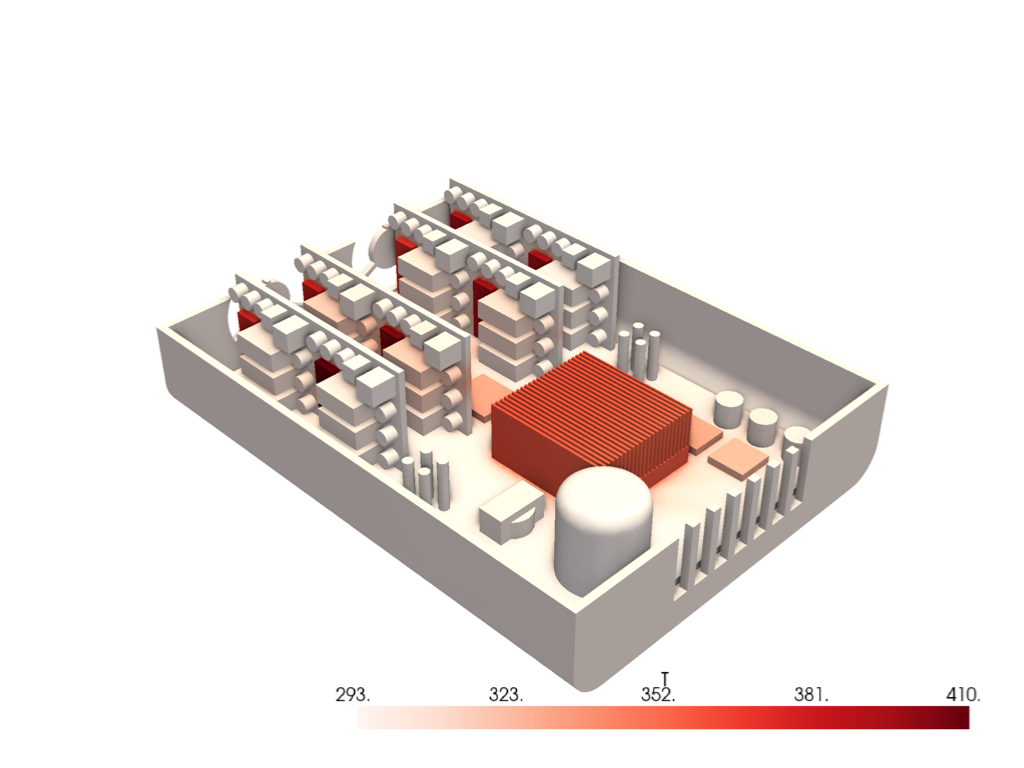
Plot Air Velocity#
Let’s plot the velocity of the air.
Start by clipping the air dataset with clip() and plotting it alongside the electronics.
As you can see, the air enters from the front of the case (left) and is being pushed out of the “back” of the case via a fan.
# Clip the air in the XY plane
z_slice = air.clip('z', value=-0.005)
# Plot it
pl = pv.Plotter()
pl.enable_ssao(radius=0.01)
pl.add_mesh(z_slice, scalars='U', lighting=False, scalar_bar_args={'title': 'Velocity'})
pl.add_mesh(structure, color='w', smooth_shading=True, split_sharp_edges=True)
pl.camera_position = 'xy'
pl.camera.roll = 90
pl.enable_anti_aliasing('fxaa')
pl.show()
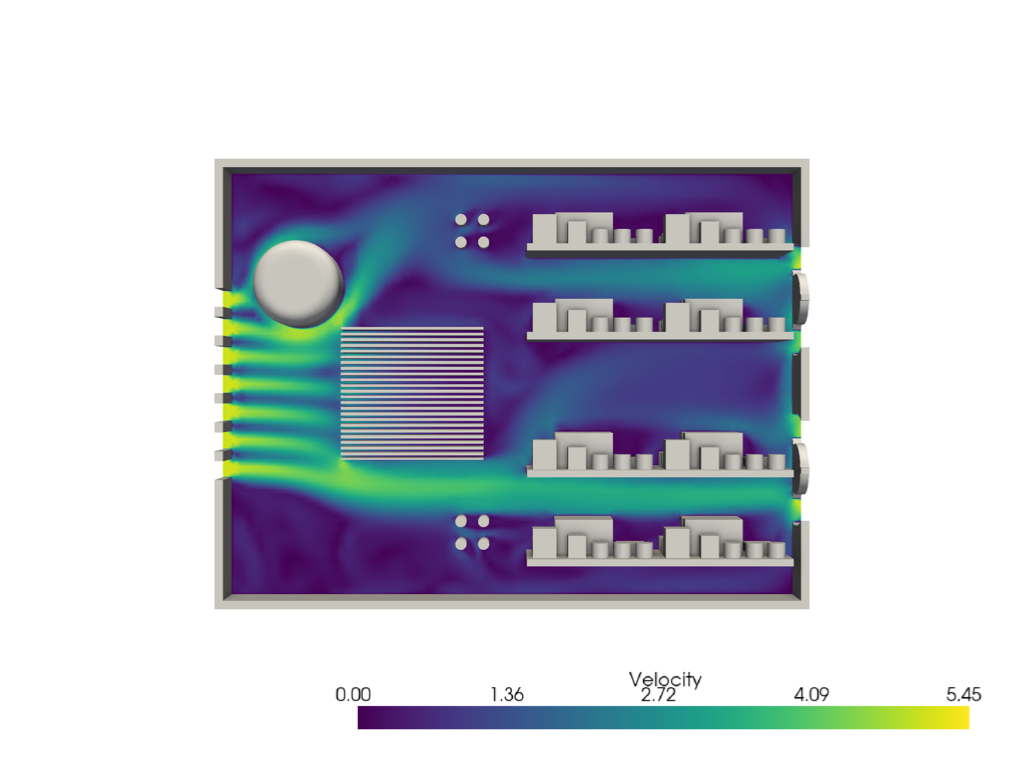
Plot Air Temperature#
Let’s also plot the temperature of the air. This time, let’s also plot the temperature of the components.
pl = pv.Plotter()
pl.enable_ssao(radius=0.01)
pl.add_mesh(
z_slice, scalars='T', lighting=False, scalar_bar_args={'title': 'Temperature'}, cmap='reds'
)
pl.add_mesh(
structure,
scalars='T',
smooth_shading=True,
split_sharp_edges=True,
cmap='reds',
show_scalar_bar=False,
)
pl.camera_position = 'xy'
pl.camera.roll = 90
pl.enable_anti_aliasing('fxaa')
pl.show()
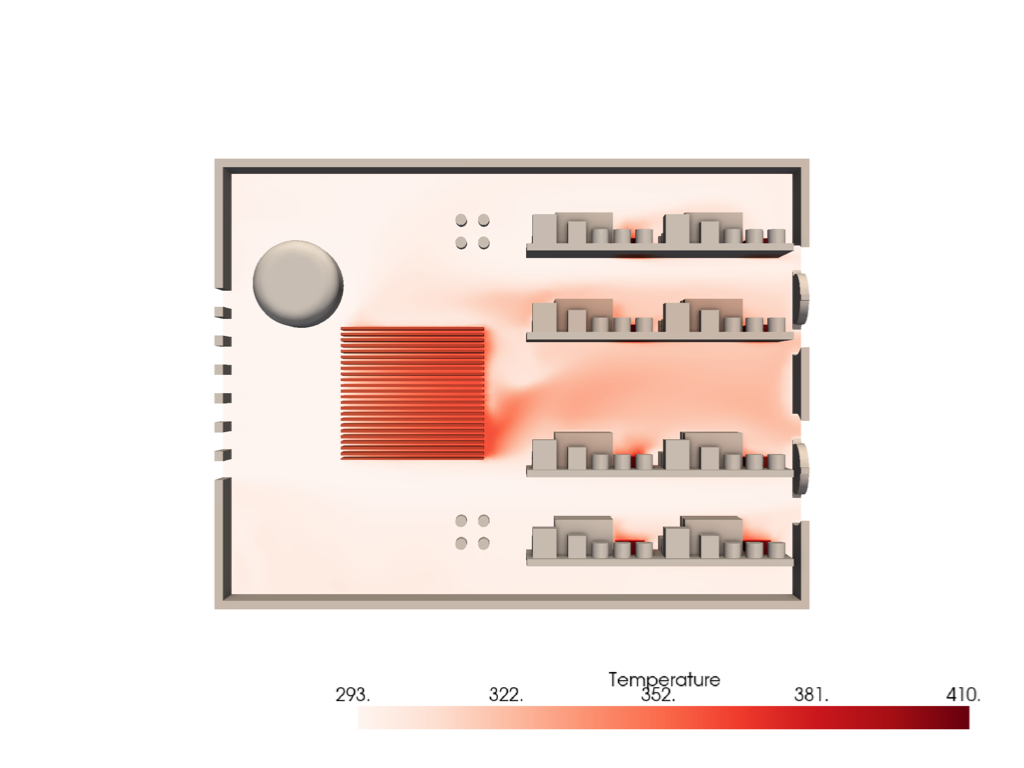
Plot Streamlines - Flow Velocity#
Now, let’s plot the streamlines of this dataset so we can see how the air is flowing through the case.
Generate streamlines using streamlines_from_source().
# Have our streamlines start from the regular openings of the case.
points = []
for x in np.linspace(0.045, 0.105, 7, endpoint=True):
points.extend([x, 0.2, z] for z in np.linspace(0, 0.03, 5))
points = pv.PointSet(points)
lines = air.streamlines_from_source(points, max_time=2.0)
# Plot
pl = pv.Plotter()
pl.enable_ssao(radius=0.01)
pl.add_mesh(lines, line_width=2, scalars='T', cmap='reds', scalar_bar_args={'title': 'Temperature'})
pl.add_mesh(
structure,
scalars='T',
smooth_shading=True,
split_sharp_edges=True,
cmap='reds',
show_scalar_bar=False,
)
pl.camera_position = 'xy'
pl.camera.roll = 90
pl.enable_anti_aliasing('fxaa') # also try 'ssaa'
pl.show()
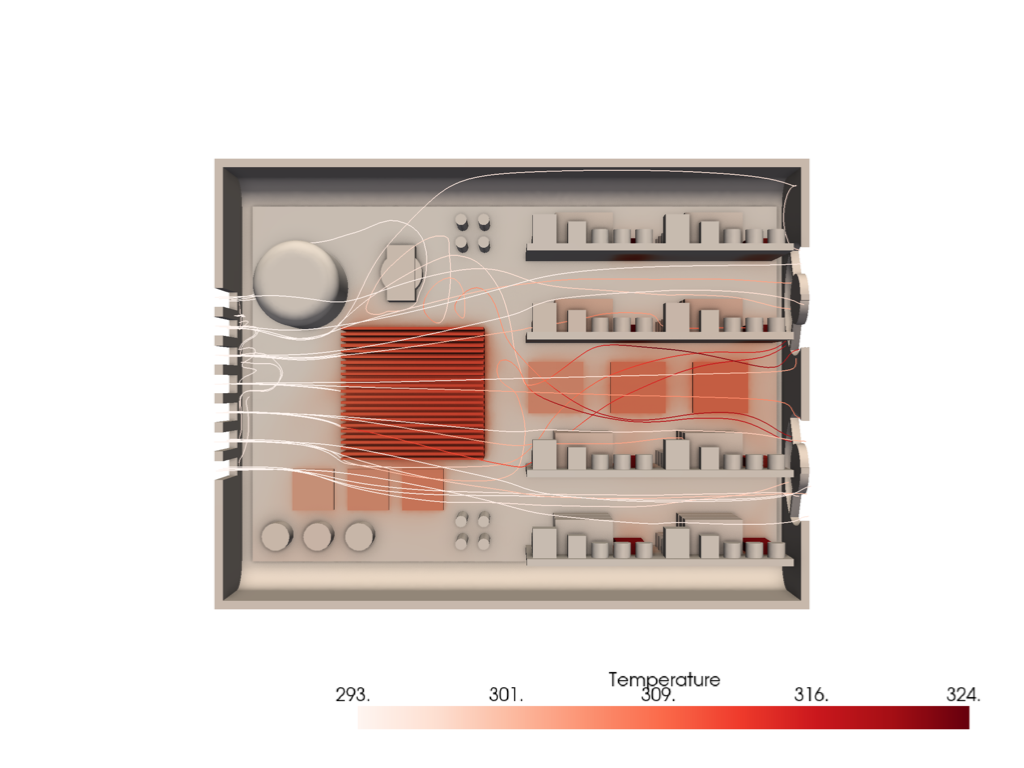
Volumetric Plot - Visualize High Temperatures#
Show a 3D plot of areas of temperature.
For this example, we will first sample the results from the
pyvista.UnstructuredGrid onto a pyvista.ImageData using
sample(). This is so we can visualize
it using add_volume()
bounds = np.array(air.bounds) * 1.2
origin = (bounds[0], bounds[2], bounds[4])
spacing = (0.002, 0.002, 0.002)
dimensions = (
int((bounds[1] - bounds[0]) // spacing[0] + 2),
int((bounds[3] - bounds[2]) // spacing[1] + 2),
int((bounds[5] - bounds[4]) // spacing[2] + 2),
)
grid = pv.ImageData(dimensions=dimensions, spacing=spacing, origin=origin)
grid = grid.sample(air)
opac = np.zeros(20)
opac[1:] = np.geomspace(1e-7, 0.1, 19)
opac[-5:] = [0.05, 0.1, 0.5, 0.5, 0.5]
pl = pv.Plotter()
pl.add_mesh(structure, color='w', smooth_shading=True, split_sharp_edges=True)
vol = pl.add_volume(
grid,
scalars='T',
opacity=opac,
cmap='autumn_r',
show_scalar_bar=True,
scalar_bar_args={'title': 'Temperature'},
)
vol.prop.interpolation_type = 'linear'
pl.camera.zoom(2)
pl.show()
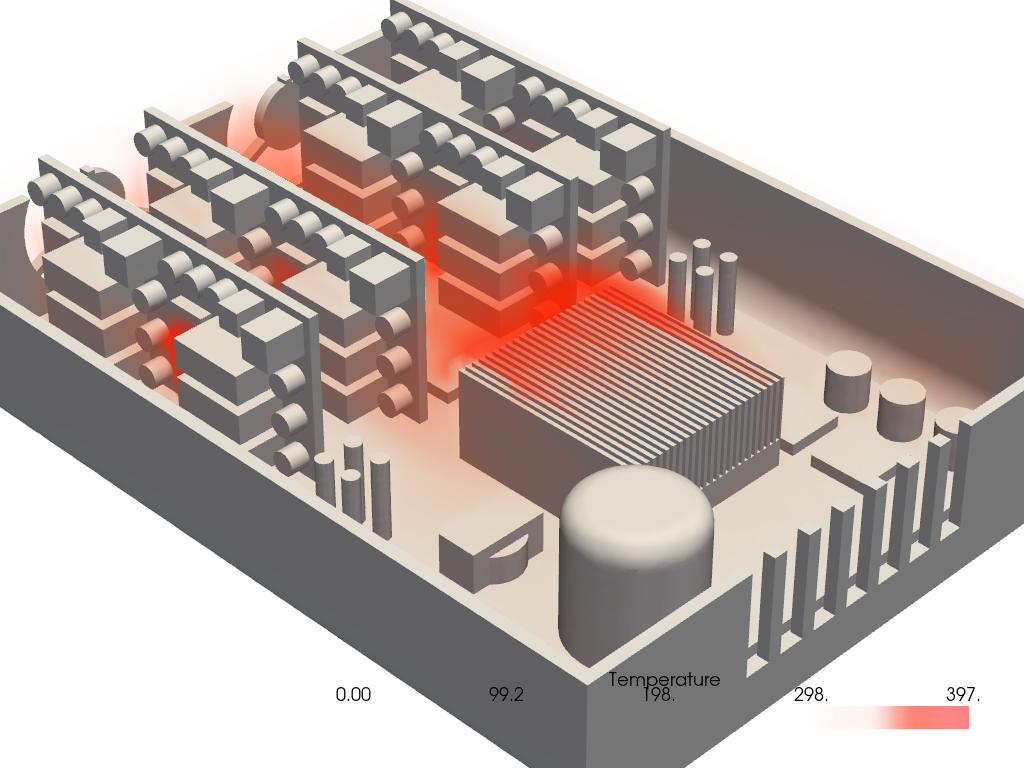
Total running time of the script: (0 minutes 39.306 seconds)